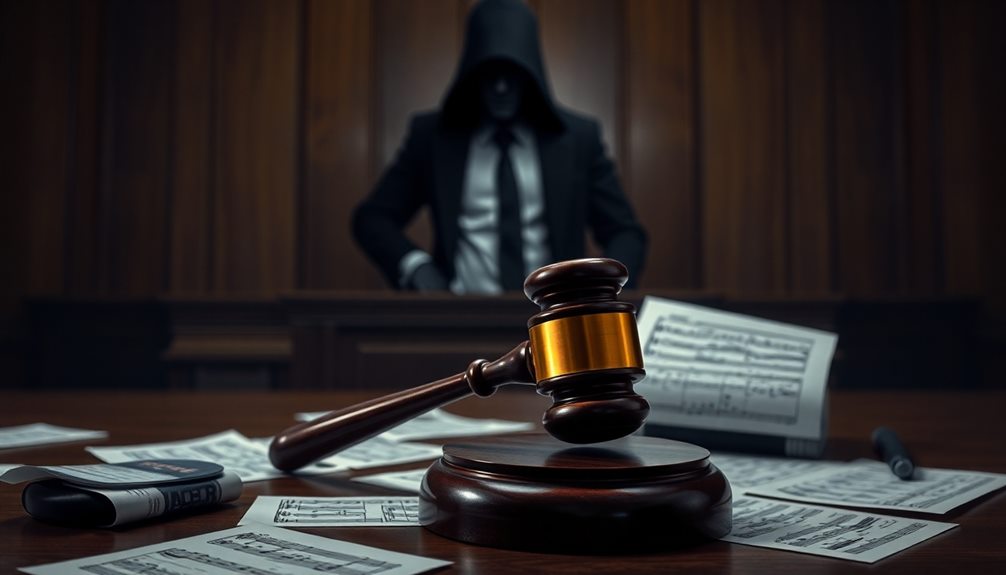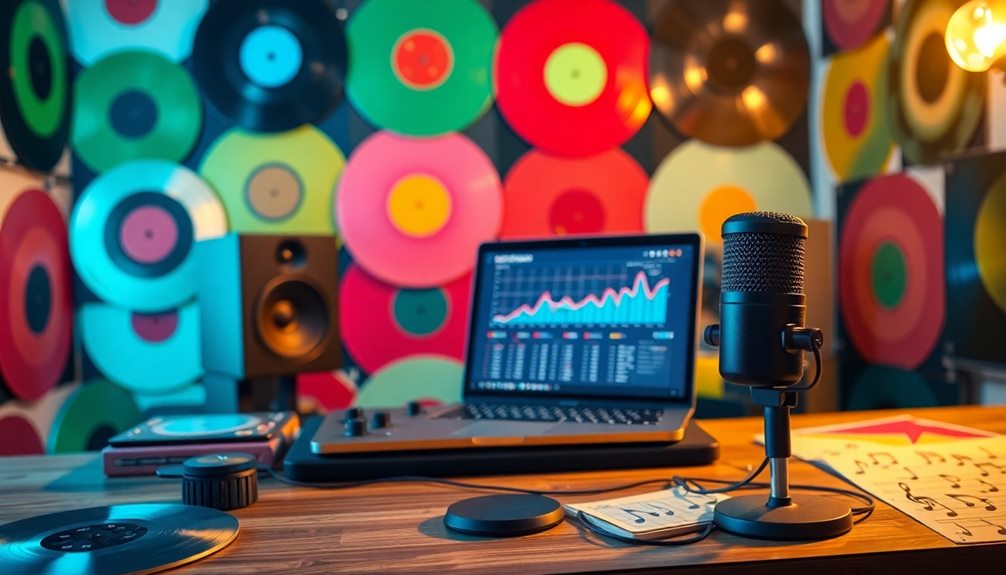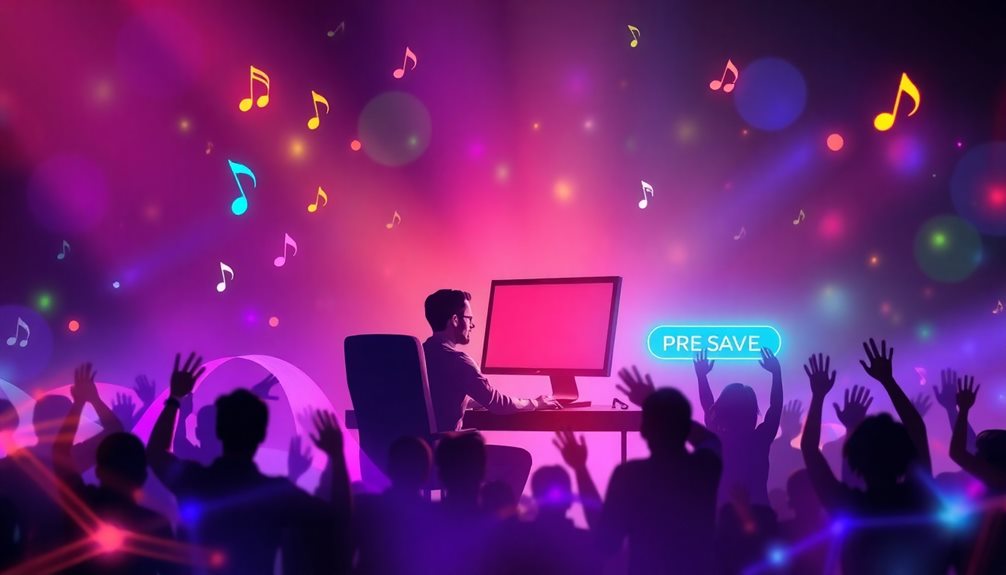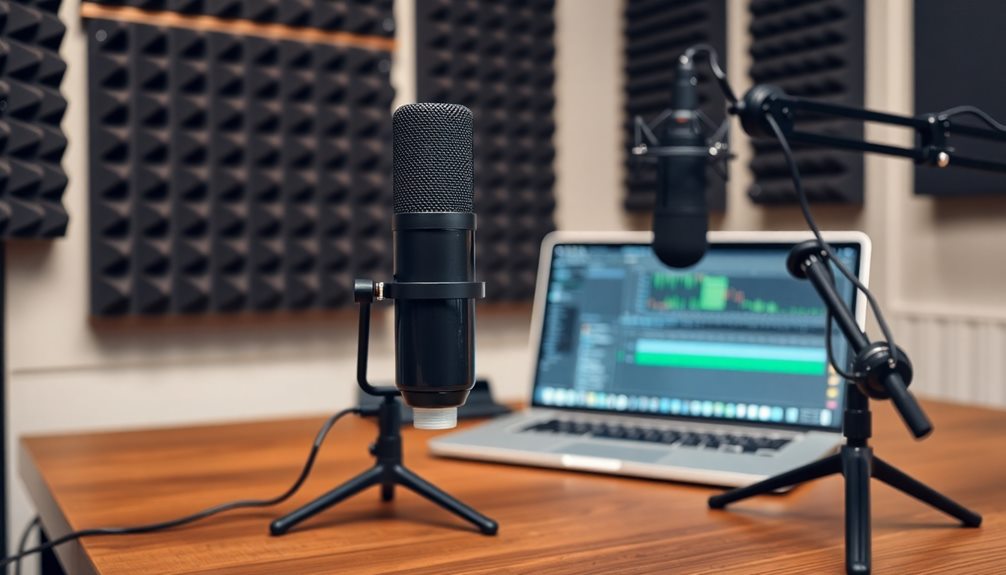You can't sample a song without permission unless you want to risk big trouble! When you use someone else's music, you're borrowing their hard work, just like if you took a toy from a friend. If you don't get the right licenses, you might face lawsuits or have to pay huge fines. Plus, it can hurt your chances of sharing music in the future. Sometimes, you can use a little of a song under something called "fair use," but it's tricky and doesn't always protect you. Want to know how to safely sample? There's more to discover!
Key Takeaways
- Sampling a song without permission can lead to copyright infringement allegations and potential lawsuits.
- Unauthorized sampling may result in significant monetary damages if legal action is taken.
- Risks increase with commercial use, especially if over 1,000 copies are sold.
- Fair use offers limited protection and often requires permission for recognizable elements like melody and lyrics.
- Proper sample clearance is essential to prevent legal troubles and maintain a positive reputation in the music industry.
Understanding Sampling and Copyright
Understanding sampling and copyright is essential for any aspiring musician or producer. When you think about sampling, remember that using someone else's music without permission can lead to big legal issues.
Every song is automatically protected by copyright, which means you need to get permission from the original creators to use their work. This is where licenses come in. You'll need a Master Recording License for the actual sound and a Composition License for the song's lyrics and music.
Now, you might hear about fair use. This idea lets you use short snippets of music without asking, but it's tricky! Fair use looks at factors like how you use the sample and if it changes the original song enough.
If you don't follow the rules, you might face serious consequences, like lawsuits or losing the chance to share your music.
To make sampling easier, consider connecting with performing rights organizations like BMI or ASCAP. They can help you understand music rights and find the right people to ask for permission.
Sampling can be a fantastic tool for creativity, so knowing the ins and outs of copyright will make your musical journey much smoother!
The Role of Reversed Samples
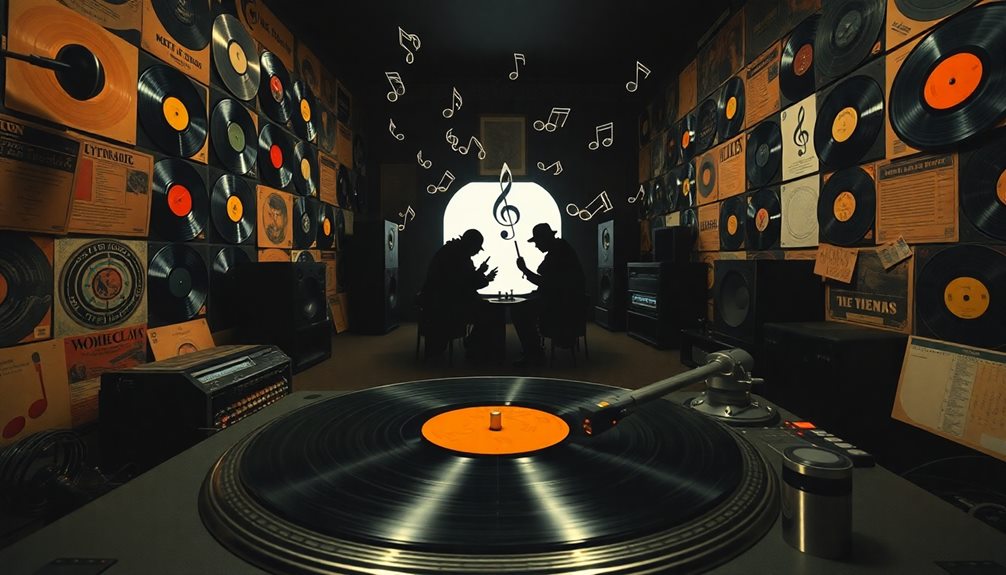
In music production, reversed samples can add a distinctive flair, transforming ordinary sounds into something truly mesmerizing. When you play audio segments backward, you create unique effects that can surprise and delight listeners. This technique can change the original sound's melody and rhythm, making it feel fresh and exciting.
Whether it's a catchy beat or a mesmerizing vocal line, reversed samples give you endless creative possibilities.
Modern Digital Audio Workstations (DAWs) make reversing samples easy, allowing you to experiment with familiar sounds. However, it's important to remember that using reversed samples doesn't automatically protect you from copyright infringement. If the resulting sound remains recognizable, the original artist could still claim their rights.
Legal assessments often focus on identifiable elements like melody and rhythm, meaning even your cleverly transformed samples might pose risks without proper clearance.
Legal Consequences of Unauthorized Sampling
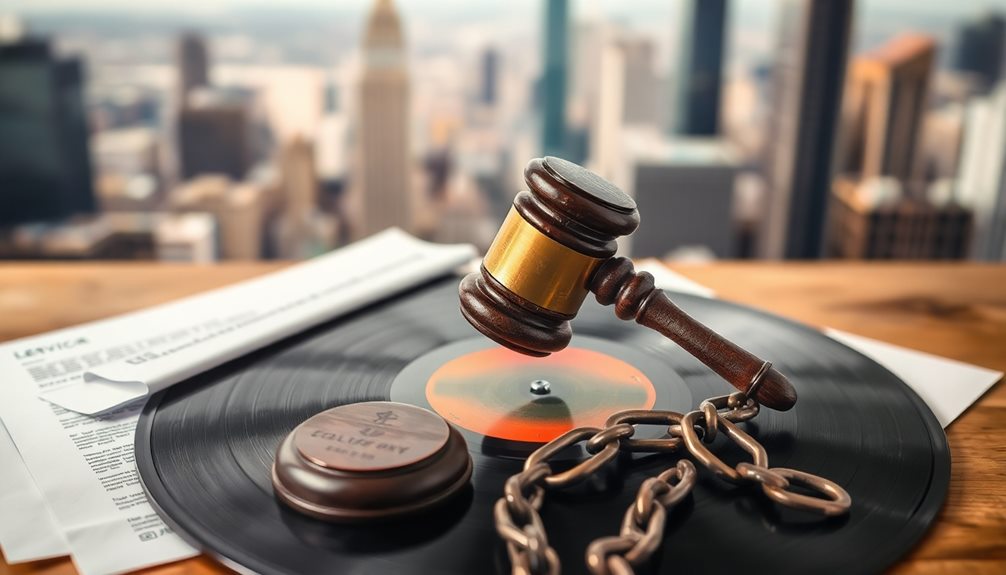
Using reversed samples may add a creative twist to your music, but it doesn't shield you from the legal pitfalls of unauthorized sampling. If you decide to use a music sample without permission, you might face copyright infringement allegations. This could lead to lawsuits and even monetary damages!
Imagine putting your heart and soul into a song, only to find out you can't share it because you didn't get proper clearance.
The risk of legal repercussions grows, especially if your track sells more than 1,000 copies. That's a big deal! While fair use can sometimes protect small portions of music used for education or commentary, it's not a guaranteed safety net. You could still be challenged legally.
Also, unauthorized sampling can hurt your reputation in the music industry. Artists work hard to build their credibility, and a legal battle can damage that.
When Sample Clearance Is Required
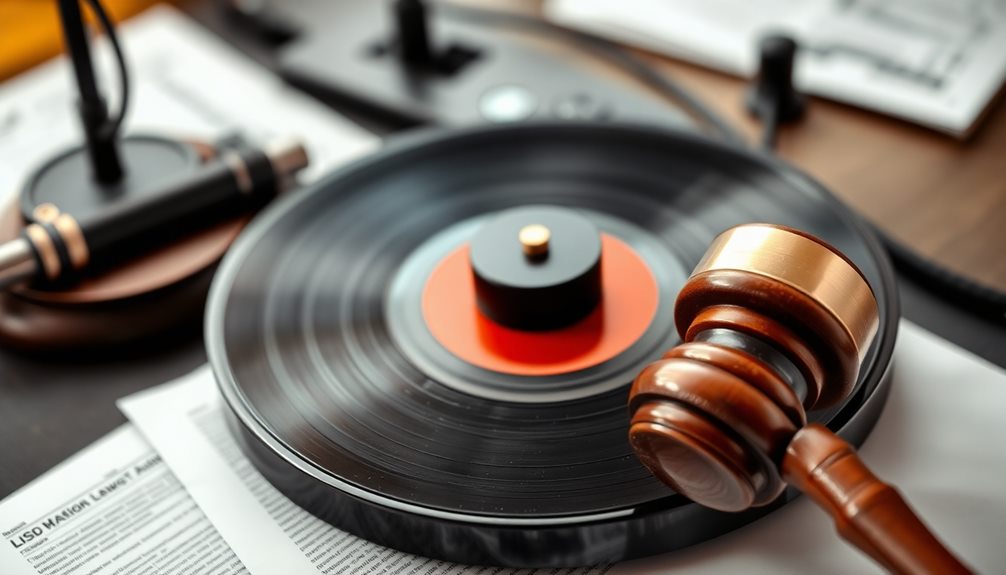
When you're sampling music, it's super important to know when you need to get clearance!
If you plan to share your music with others, you'll definitely need permission from the original song's creators.
But don't worry, live performances usually don't require this, although recorded versions do.
Public Distribution Requirements
Distributing music to the public requires careful attention to sample clearance, as failing to secure the necessary permissions can lead to legal complications.
When you sample a song, it's crucial to get permission to use that piece, especially if you plan to share your music widely.
Here's what you need to remember:
- You must obtain clearance from the copyright holder of the original recording.
- You'll need another clearance for the underlying composition, which means getting permission from the song's copyright owner.
- If the sample isn't easily recognizable, you might avoid clearance, but it's important to assess how similar it's to the original.
Live Performance Exemptions
Live performances often enjoy a level of leniency regarding sample clearance due to venue licensing agreements, which typically cover the public performance of copyrighted music. This means when you're on stage, you mightn't need permission to sample a song.
However, if you decide to record that live performance and share it with the world, you'll need to think again. That's when sample clearance comes back into play.
While playing sampled music at home is fine, remember that public performances or broadcasts are different. If the sampled material isn't easily recognizable to most listeners, you might get lucky and avoid clearance requirements, but that's a risky assumption. You never know when a copyright owner might notice!
When sampling popular recordings, two clearances are essential. One from the recording copyright owner and another from the song copyright owner.
If you're unsure about the rules or need specific guidance, getting legal advice is a smart move. Protect yourself while sharing your amazing talent!
Enjoy your live performances, but stay informed about sample clearance to keep the joy flowing!
Fair Use Considerations
Understanding fair use is essential if you're considering sampling music. It's exciting to think about using samples, but you need to be careful. The fair use rule doesn't always protect you when sampling copyrighted material without permission.
So, let's look at some important points:
- You usually need sample clearance. This means getting permission to sample from both the recording copyright owner and the song copyright owner.
- Copyright laws can be tricky, especially when it comes to identifiable elements like melody and lyrics. If those are recognizable, you'll likely need clearance.
- Playing sampled music privately or during live performances mightn't need clearance, thanks to venue licensing agreements.
To avoid copyright infringement, always think about proper licensing before using samples. While the fair use doctrine may apply in certain situations, it's safer to get permission to sample.
You wouldn't want to face legal trouble later! So, before you plunge into your next project, make sure you're clear on what you need to do. It'll save you a lot of headaches and help you create amazing music!
Strategies for Safe Sampling
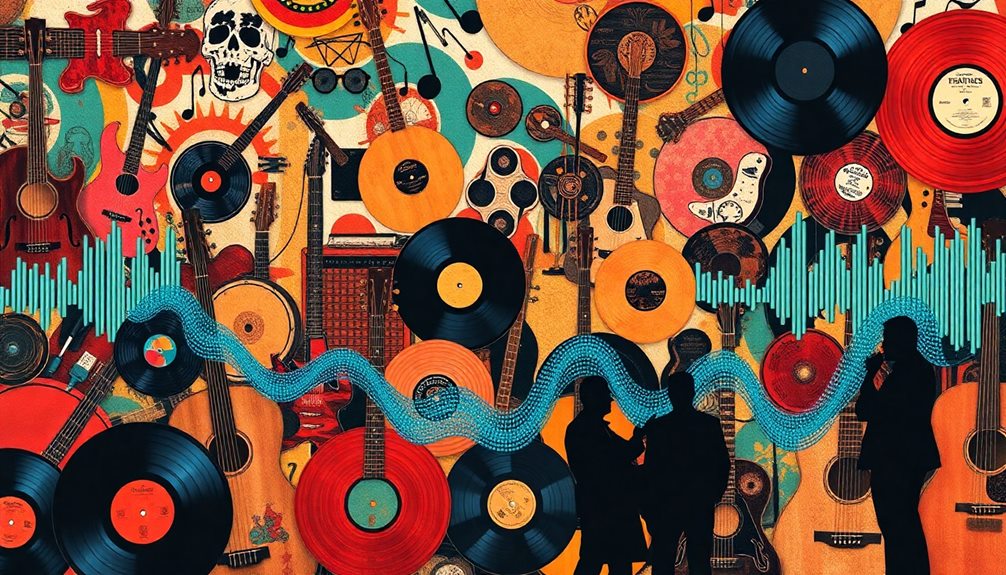
When it comes to sampling safely, artists have several strategies at their disposal to minimize legal risks. One great way is to alter samples through effects, tempo changes, or pitch shifts. This can make the sounds unrecognizable, helping you avoid copyright issues. You can also use sample packs with pre-cleared audio snippets. These allow you to use samples without needing individual permission from the copyright holder.
Collaborating with independent musicians is another fun option! By creating original samples together, you enhance your music's uniqueness and steer clear of legal complications. If you're looking for something easy, exploring royalty-free music libraries can be a treasure chest of tracks, letting you use them without stress.
Lastly, don't forget about public domain works! These are pieces that no longer have copyright protection, so you can use and modify them freely.
Here's a quick look at your sampling options:
| Strategy | Benefits | Risks |
|---|---|---|
| Altering Samples | Reduces recognition | May still infringe |
| Using Sample Packs | Pre-cleared audio | Limited selection |
| Collaborating with Musicians | Unique, original sounds | Requires trust |
| Exploring Royalty-Free Music | No licensing fees | Quality may vary |
Seeking Permission and Legal Advice
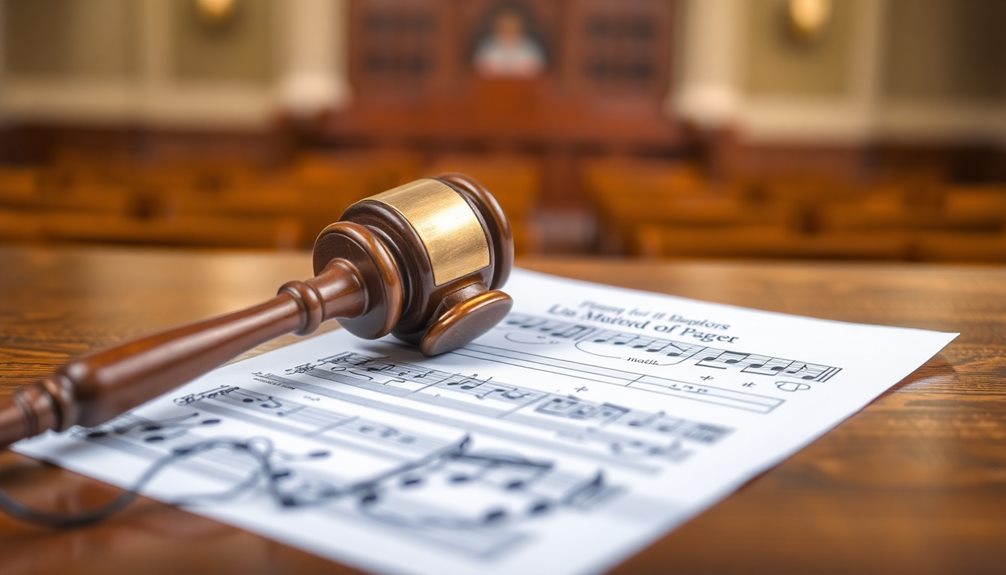
When you're thinking about sampling a song, getting permission from the original owners is super important!
Not only does it help you avoid legal trouble, but it also shows respect for the artists who created the music you love.
Plus, chatting with a lawyer who knows copyright laws can make the whole process a lot easier and keep you from unexpected costs down the road!
Importance of Sample Clearance
Securing sample clearance is essential for any artist looking to incorporate existing music into their work. You want to avoid copyright infringement, which can lead to costly legal troubles.
To do this, you need permission from two key sources: the recording copyright owner for a Master Recording License and the song copyright owner for a Composition License.
Here are a few important things to remember about sample clearance:
- Always communicate clearly with rights holders about how you plan to use the samples.
- Understand your legal obligations, as many record contracts put the responsibility of securing sample clearances on you.
- Consider consulting an intellectual property attorney for expert guidance in maneuvering these rules.
Legal Consultation Necessity
Steering through the complexities of copyright laws in music sampling isn't something to take lightly. If you're thinking about sampling a song, you need to understand the importance of getting legal advice first. Each case can be different, based on the specific sample you want to use. A legal expert can help you figure out who owns the rights to the music and what permission you need to get.
Often, record contracts say that the artist must clear samples. This means if you're not careful, you might end up in a tough spot. Consulting with an intellectual property attorney is a smart move. They can guide you through the sample clearance process and help you avoid costly legal battles.
You'll also want to learn about the types of licenses you need, like the Master Recording License and the Composition License. Knowing the difference is key to staying on the right side of copyright laws.
Understanding Copyright Responsibilities
Steering copyright responsibilities in music sampling requires clear understanding and proactive steps. If you want to use a sample, you need to obtain permission from both the recording copyright owner and the song copyright owner. This sounds tricky, but it's crucial to stay legal!
Here are three important things to keep in mind:
- Always check your record contract. It often places the responsibility of obtaining sample clearance on you.
- Use resources from performing rights organizations like BMI, ASCAP, and SESAC. They can help you locate rights holders and make permission requests easier.
- Consult an intellectual property attorney. They can guide you through the legal maze of copyright laws.
Failing to secure permission can lead to serious legal troubles, including lawsuits and damage to your reputation.
So, don't rush into sampling without thinking! Take the time to understand your responsibilities, seek permission, and get the necessary clearance.
It's not just about creativity; it's about respecting the work of others and keeping your music journey joyful and free from legal headaches.
Happy sampling!
Costs of Sample Clearance

When considering the costs of sample clearance, it's crucial to understand the significant differences between indie and major labels.
If you're using a sample from an indie label, you might pay little or nothing at all. They often just ask for credit!
However, when you sample a song from a major label, it can get pricey. Advance payments can range from $250 to $5,000, depending on how popular the song is and what the rights holders demand.
But that's not all! Major publishers might also want a share of your royalties, sometimes up to 50%.
That means careful financial planning is super important. If you keep your sample short and limit its usage, you might've a better chance to negotiate costs.
Fair Use and Its Limitations
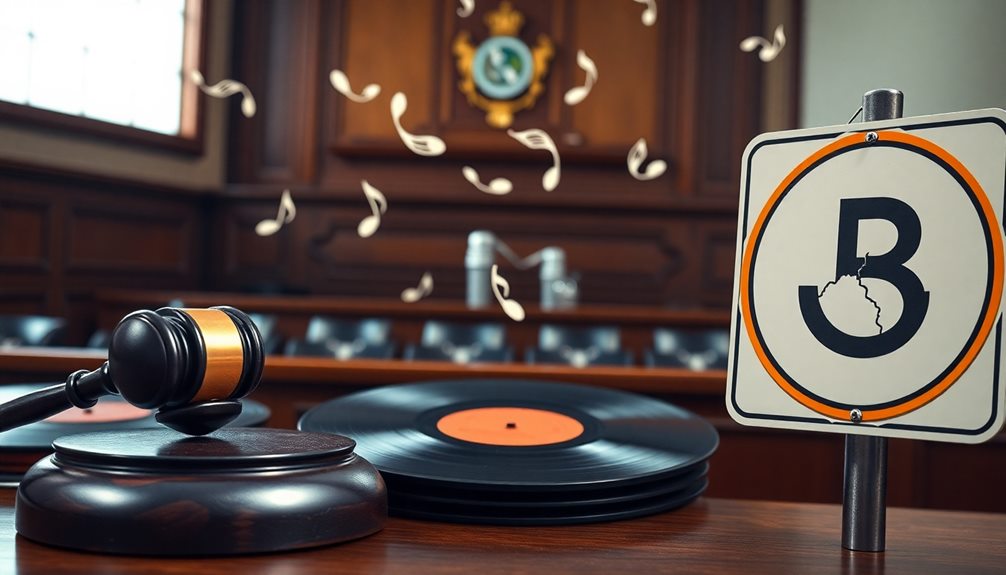
Though fair use can seem like a safety net for sampling copyrighted material, it's important to recognize its limitations. Fair use is a legal doctrine that lets you use small bits of copyrighted material without permission, but it's not a free pass.
Here are some key points to keep in mind:
- The purpose of your use matters. Educational or commentary uses have a better chance of being fair use.
- The amount of copyrighted material you use matters too. Short samples might be safer, but if they're essential to your song, you could be in trouble.
- The effect on the market value of the original work is significant. If your sample hurts its sales, that's a red flag.
Commercial uses carry a higher risk of infringement. So, if you're thinking of sampling songs for profit, you really need to tread carefully.
Alternatives to Sampling Without Permission

Sampling without permission can lead to legal headaches, but there are plenty of alternatives that can keep your creativity flowing while steering clear of copyright issues.
Instead of sampling, why not create original music inspired by the works you love? This way, you'll avoid any legal trouble and spark your creativity! Additionally, utilizing AI in Business can help you generate unique sounds and compositions tailored to your vision.
You can also explore royalty-free music libraries. These collections offer a fantastic range of tracks you can use without the need for additional licensing fees. It's a great way to find the perfect sound for your project!
Another option is public domain music. This music is free to use, modify, and share, so you can create something unique without worrying about copyright concerns.
Sample packs are another fun choice. They provide pre-cleared audio snippets you can use in your music, making everything easier without needing to clear each sample individually.
Lastly, consider collaborating with independent musicians. Together, you can create original samples just for your project, ensuring you have full ownership and no legal risks.
With these alternatives, you can enjoy making music without the stress of copyright issues!
Frequently Asked Questions
Is It Illegal to Sample a Song Without Permission?
Yes, it's illegal to sample a song without permission. Doing so can lead to serious legal trouble, including lawsuits and financial penalties. Always secure proper licensing to protect yourself and respect the original creators.
Will I Get Sued if I Sample a Song?
Sampling a song without permission's like dancing on a tightrope—exciting but risky. You could get sued, especially if your track sells well. Always consider licensing to keep your creative journey smooth and worry-free.
Can You Legally Parody a Song Without Permission?
You can legally parody a song without permission, but make certain you transform it considerably. Courts consider various factors, so it's wise to evaluate your work carefully and seek legal advice to avoid potential complications.
How to Not Get Sued for Sampling?
Sampling's like walking a tightrope—balance it right. Always get permission from copyright owners, explore royalty-free music, and consult an attorney. Stay informed about fair use to avoid potential legal pitfalls that could trip you up.
Conclusion
So, while it might seem like a fun idea to sample a song without asking, remember, it can lead to big trouble! You wouldn't want to accidentally turn your hit into a legal nightmare, right? Instead, why not seek permission or find cool alternatives? After all, creating your own unique sound can be just as exciting! Embrace the joy of making music the right way, and your creativity will shine even brighter. Happy sampling!
